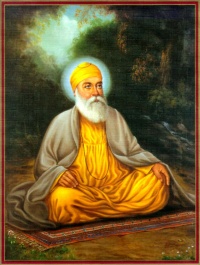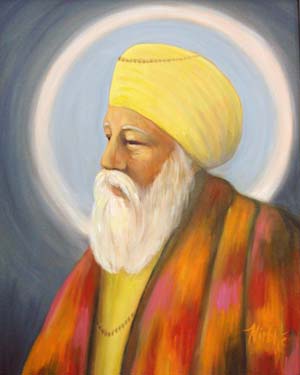Guru Nanak
Guru Nanak (15 April 1469 - 7 May 1539),is the founder of Sikhism and the first of the ten Gurus of the Sikhs. He was born in the village of Talwandi also called Rai Bhoeki Talwandi, now known as Nankana Sahib, near Lahore in present-day Pakistan. He was born, according to all ancient Sikh records, in the early morning of the third day of the light half of the month of Baisakh (Apil-May) in the year 1469 AD; but for conveniance sake his anniversary is now observed by the Sikhs on the occaision of the full moon in the month of Kartik (October-November). Before Guru Nanak breathed his last in 1539, his name had travelled not only throughout India's north, south, east and west, but also far beyond into Arabia, Messopotania, Ceylon, Afghanistan, Burma and Tibet.
- Birth Anniversary:(Lunar Linked) 15 November in 2005; 5 Nov in 2006 24 Nov in 2007 and 13 Nov 2008
- Life Span: 1469 to 1539; 70 years
- Place of Birth: Nankana Sahib, Talwandi, Panjab (in present day Pakistan)
- Father: Kalyan Dass Ji (also known as Mehta Kalu Ji) and Mother: Mata Tripta Ji
- Wife: Mata Sulakhni Ji
- Sons: Baba Sri Chand Ji and Baba Lakhmi Das Ji; No Daughters
- Guruship: Spanned the whole of Guru Ji Life
- Gurbani: Japji, Sidh Gosht, Sohilaa, Dakhni Onkar, Asa di Var, Patti, Bara Mah, Total of 974 Shabads in 19 Ragas
His Path
It was a dark moonless night; the clouds were heavy with rain because it was the monsoon season. Suddenly thunder sounded and lightning flashed as a few rain drops started to fall. The village was asleep. Only Nanak was awake and the echo of his song filled the air.
Nanak’s mother was worried because the night was more than half over and the lamp in his room was still burning. She could hear his voice as he sang. She could restrain herself no longer and knocked at his door, “Go to sleep now, my son. Soon it will be dawn.” Nanak became silent. From the darkness sounded the call of the sparrowhawk, “Piyu, piyu, piyu!” it called.
“Listen, mother!” Nanak, called out. “The sparrowhawk is calling to his beloved; how can I be silent, because I am competing with him? I will call my beloved as long as he calls his – even longer because his beloved is nearby, perhaps in the next tree! My beloved is so far away. I will have to sing for lives upon lives before my voice reaches Him.” Nanak resumed his song.
Guru Nanak’s path was decorated with songs; he attained God by singing to Him. Guru Nanak practiced no austerities or meditation or yoga; he only sang, and singing, he arrived. He sang with all his heart and soul, so much so that his singing became meditation; his singing became his purification and his yoga. This was Nanak’s path; decorated with songs and flowers. Whatever he has said was said in verse, and his songs are not those of an ordinary singer; they have sprung from within one who has known. There is the ring of truth, the reflection of God within them. It are these songs, songs of love and expressions of worship, along with the songs of Guru Nanak's nine predecessors, that form's the eternal Guru of the Sikhs, the Sri Guru Granth Sahib.
Background
His father was Kalayan Das Mehta also known as Kalu Mehta and mother was Matta Tripat ji. They were both Hindus and belonged to the Vedic Brahmin caste. Guru ji had an older sister called Bebey Nanki, who was the first to recognise Nanak as an enlightened Soul. Guru Nanak from an early age seemed to have aquired a questioning and enquiring mind and refused as a child to wear the ritualistic “sacred” thread called a Janeu and instead said that he would wear the true name of God in his heart for his protection, as the thread which could be broken, be soiled, burnt or lost could not offer any security at all.
Nanak married Sulkhni, of Batala, and they had two sons, Sri Chand and Lakhmi Das. Guru ji brother-in-law, the husband of his sister Nanki, obtained a job for him in Sultanpur as the manager of the government granary. One morning, when he was twenty-eight, he went as usual down to the river to bathe and meditate. It was said that he was gone for three days. When he reappeared, filled with the spirit of God, he said, "There is no Hindu and no Musalman." It was then he began his missionary work.
As a householder, Guru ji continued to carry out the mission of his life – To lead people to the true path of God; to dispel superstition; to bring people out of ritualistic practises; to lead them directly to follow Gurbani – without the need for priests and clergy; restrain and guard against the five thieves within – Pride, Anger, Greed, Attachment and Lust.
The Three Pillars of Sikhism
It was here that Guru Nanak formalised the three important pillars of Sikhism:
1. Guru ji led the Sikhs directly to practise Simran and Naam Japna – meditation on God and reciting and chanting of God’s Name - Waheguru
2. He asked the Sikhs to live as householders and practise Kirat Karni – To honestly earn by ones physical and mental effort while accepting Gods gifts and blessing.
3. The Sikhs were asked to share their wealth within the community by practising Vand Chakna – “Share and Consume together”
Contributions to Humanity
Guru Nanak was revered by both Hindus and Muslims and this is crystallised when on his death they both quarrel about whether his body should be cremated as per the Hindu tradition or buried as per Islamic tradition.
His contributions to humanity were more advanced then by anyone else on earth at the time including western nations. His main contributions were:
- Equality of Humans: When in the West Slavery and race discrimination was rife and respect between the different classes and caste was at a peak, Guru Nanak preached against discrimination and prejudices due to race, caste, status, etc. He said: "See the brotherhood of all mankind as the highest order of Yogis; conquer your own mind, and conquer the world." (SGGS page 6); also "There is one awareness among all created beings." (page 24) and finally "One who recognizes the One Lord among all beings does not talk of ego. ||4||" (page 432). He urges all the peoples of the world to "conquer" their minds to these evil practises. All human beings had the light of the Lord and were the same



